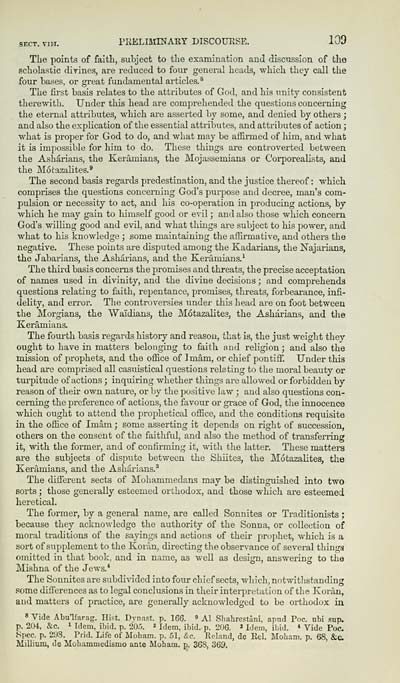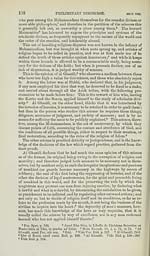Download files
Complete book:
Individual page:
Thumbnail gallery: Grid view | List view

SECT. viH. PRELiariNAKY DISCOUESE. 109
The points of faitli, subject to the examination and discussion of the
scholastic dirines, are reduced to four general heads, which they call the
four bases, or great fundamental articles. *
The fii-st basis relates to the attributes of God, and his unity consistent
therewitli. Under this head are comprehended the questions concerning
the eternal attributes, which are asserted by some, and denied by others ;
and also the explication of the essential attributes, and attributes of action ;
what is proper for God to do, and what may be affirmed of him, and what
it is impossible for him to do. These things ai-e controverted between
the Ashariaus, the Keramiaus, the Mojassemians or Corporealists, and
the M6tazalites.9
The second basis regards predestination, and the justice thereof : which
comprises the questions conceiTiing God's purpose and decree, man's com-
pulsion or necessity to act, and his co-operation in producing actions, by
which he may gain to himself good or evil ; and also those which concern
God's willing good and evil, and what things are subject to his power, and
what to his knowledge ; some maintaining the affii-mative, and others the
negative. These points are disputed among the Kadarians, the Najarians,
the Jabarians, the Asharians, and the Keraniians.'
The third basis concerns the promises and threats, the precise acceptation
of names used in divinity, and the divine decisions ; and comprehends
questions relating to faith, repentance, promises, threats, forbearance, infi-
delity, and en-or. The controversies under this head are on foot between
the Morgians, the Waidians, the Motazalites, the Asharians, and the
Keramiaus.
The fourth basis regards history and reason, that is, the just weight they
ought to have in matters belonging to faith and religion ; and also the
mission of prophets, and the office of ] mam, or chief pontiff Under this
head are comprised all casuistical questions relating to the moral beauty or
turpitude of actions ; inquiring whether things are allowed or forbidden by
reason of their own nature, or by the positive law ; and also questions con-
cerning the preference of actions, the favour or grace of God, the innocence
which ought to attend the prophetical office, and the conditions requisite
in the office of Imam ; some asserting it depends on right of succession,
othere on the consent of the faithful, and also the method of transferring
it, with the former, and of confirming it, with the latter. These mattera
are the subjects of dispute between the Shiites, the Motazalites, the
Keramians, and the Asharians.^
The diiferent sects of Mohammedans may be distinguished into two
sorts ; those generally esteemed orthodox, and those wMch are esteemed
heretical.
The foi-mer, by a general name, are called Sonnites or Traditionists :
because they acknowledge the authority of the Sonna, or collection of
moral traditions of the saj-ings and actions of their prophet, which is a
sort of supplement to the Koriln, directing the observance of several thinga
omitted in that book, and in name, as well as design, answering to the
MLshna of the Jews.*
The Sonnites are subdivided into four chief sects, which, notwithstanding
Rome diS'erences as to legal conclusions in their interpretation of the Koran,
and matters of practice, are generally acknowledged to be orthodox in
8 Vide Abu'lfarag. Hi?t. Dynast, p. 166. » Al Sliahrestani, apud Poc. ubi sup.
p. 204, &c. 1 Ifiem. ibid. p. 205. » Idem, ibid. p. 206. » Idem, ibid. * Vide Poc
Spec. p. 2^8. Prid. Life of Moham. p. 51, &c. Roland, de Eel. Mobanu p. 68, &C.
Millium, de Mobammedismo ante Moham. p. 368, 369.
The points of faitli, subject to the examination and discussion of the
scholastic dirines, are reduced to four general heads, which they call the
four bases, or great fundamental articles. *
The fii-st basis relates to the attributes of God, and his unity consistent
therewitli. Under this head are comprehended the questions concerning
the eternal attributes, which are asserted by some, and denied by others ;
and also the explication of the essential attributes, and attributes of action ;
what is proper for God to do, and what may be affirmed of him, and what
it is impossible for him to do. These things ai-e controverted between
the Ashariaus, the Keramiaus, the Mojassemians or Corporealists, and
the M6tazalites.9
The second basis regards predestination, and the justice thereof : which
comprises the questions conceiTiing God's purpose and decree, man's com-
pulsion or necessity to act, and his co-operation in producing actions, by
which he may gain to himself good or evil ; and also those which concern
God's willing good and evil, and what things are subject to his power, and
what to his knowledge ; some maintaining the affii-mative, and others the
negative. These points are disputed among the Kadarians, the Najarians,
the Jabarians, the Asharians, and the Keraniians.'
The third basis concerns the promises and threats, the precise acceptation
of names used in divinity, and the divine decisions ; and comprehends
questions relating to faith, repentance, promises, threats, forbearance, infi-
delity, and en-or. The controversies under this head are on foot between
the Morgians, the Waidians, the Motazalites, the Asharians, and the
Keramiaus.
The fourth basis regards history and reason, that is, the just weight they
ought to have in matters belonging to faith and religion ; and also the
mission of prophets, and the office of ] mam, or chief pontiff Under this
head are comprised all casuistical questions relating to the moral beauty or
turpitude of actions ; inquiring whether things are allowed or forbidden by
reason of their own nature, or by the positive law ; and also questions con-
cerning the preference of actions, the favour or grace of God, the innocence
which ought to attend the prophetical office, and the conditions requisite
in the office of Imam ; some asserting it depends on right of succession,
othere on the consent of the faithful, and also the method of transferring
it, with the former, and of confirming it, with the latter. These mattera
are the subjects of dispute between the Shiites, the Motazalites, the
Keramians, and the Asharians.^
The diiferent sects of Mohammedans may be distinguished into two
sorts ; those generally esteemed orthodox, and those wMch are esteemed
heretical.
The foi-mer, by a general name, are called Sonnites or Traditionists :
because they acknowledge the authority of the Sonna, or collection of
moral traditions of the saj-ings and actions of their prophet, which is a
sort of supplement to the Koriln, directing the observance of several thinga
omitted in that book, and in name, as well as design, answering to the
MLshna of the Jews.*
The Sonnites are subdivided into four chief sects, which, notwithstanding
Rome diS'erences as to legal conclusions in their interpretation of the Koran,
and matters of practice, are generally acknowledged to be orthodox in
8 Vide Abu'lfarag. Hi?t. Dynast, p. 166. » Al Sliahrestani, apud Poc. ubi sup.
p. 204, &c. 1 Ifiem. ibid. p. 205. » Idem, ibid. p. 206. » Idem, ibid. * Vide Poc
Spec. p. 2^8. Prid. Life of Moham. p. 51, &c. Roland, de Eel. Mobanu p. 68, &C.
Millium, de Mobammedismo ante Moham. p. 368, 369.
Set display mode to: Large image | Transcription
Images and transcriptions on this page, including medium image downloads, may be used under the Creative Commons Attribution 4.0 International Licence unless otherwise stated. ![]()
| Early Gaelic Book Collections > J. F. Campbell Collection > Koran: or, Alcoran of Mohammed > (131) |
|---|
| Permanent URL | https://digital.nls.uk/77135536 |
|---|
| Description | Volumes from a collection of 610 books rich in Highland folklore, Ossianic literature and other Celtic subjects. Many of the books annotated by John Francis Campbell of Islay, who assembled the collection. |
|---|
| Description | Selected items from five 'Special and Named Printed Collections'. Includes books in Gaelic and other Celtic languages, works about the Gaels, their languages, literature, culture and history. |
|---|

